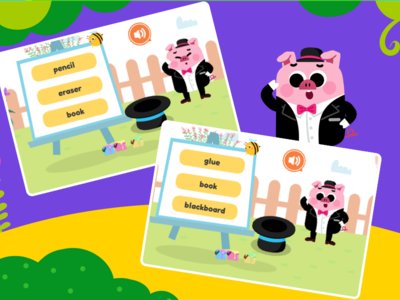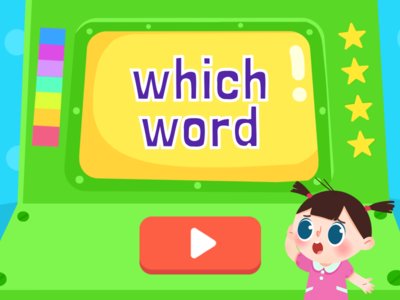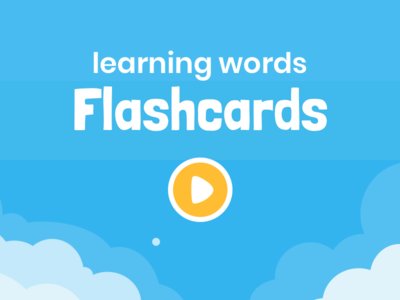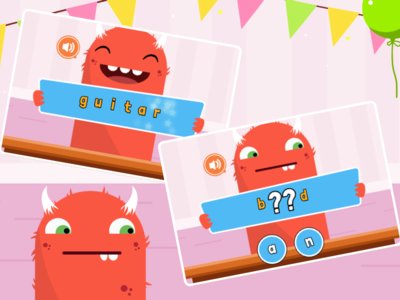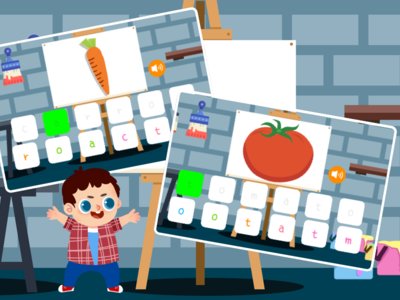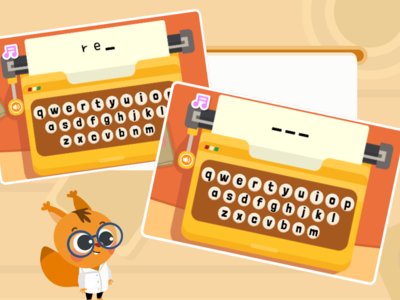The best Phonics game of words starting in D!
A Words in d teaching game for kids to learn phonics and other essential language skills would be a fun and engaging way for children to improve their reading and spelling abilities. The game would be designed to be played on a computer or other device, and would be easy to use and understand.
The game would be structured around a series of levels, each of which would introduce new phonics skills and vocabulary words. At the beginning of each level, the child would be presented with a series of words, each of which would be accompanied by a picture to help with understanding. The child would then be tasked with sounding out the words, either by saying them out loud or by typing them on the keyboard.
As the child progresses through the levels, the game would gradually increase in difficulty, introducing new sounds and words and challenging the child to use their phonics skills in more complex ways. For example, the game might include words with silent letters, words that are spelled the same but have different meanings, and words that are made up of multiple syllables.
In addition to the core phonics skills, the game would also include a variety of fun and interactive activities to help reinforce the material and keep children engaged. For example, the game might include matching games, where the child has to match the word to the corresponding picture, or memory games, where they have to remember the location of different words on a grid.
Overall, a Words in d teaching game for kids to learn phonics and other essential language skills would be a valuable tool for helping children improve their reading and spelling abilities. The game would be fun and engaging, making it an effective way for kids to learn important language skills in a way that is both enjoyable and educational.
Why young kids should play these free computer games to learn about D
There are many benefits to kids learning phonics and other essential language skills. For one, phonics is an essential component of reading, as it teaches children how to decode the individual sounds that make up words. This is an important skill, as it allows children to read words on their own, rather than relying on context or picture clues to understand them.
In addition to improving reading skills, learning phonics also helps children develop their spelling abilities. By understanding the sounds that make up words, children are better able to spell words correctly, which can help improve their overall writing skills.
The specific age at which children should begin learning phonics will vary depending on their individual development and learning abilities. However, most children are ready to start learning phonics around the age of 4 or 5, when they are typically beginning to develop more complex language skills.
Overall, it is important for children to learn phonics and other essential language skills as part of their overall education. These skills are essential for reading and writing, and will provide a foundation for more complex language skills in the future.
These are just a few examples of the many words that might be included in a Words in D game. The game could also include words with more complex phonics patterns, such as words with silent letters or words that are made up of multiple syllables. Additionally, the game could include a variety of vocabulary words, including nouns, verbs, adjectives, and adverbs, to help children develop a rich and varied English language vocabulary.
What are the best games Yahaaa offers for this?
The most common types of English vocabulary education games are likely to be those that are interactive, fun, and engaging, and that focus on teaching children new vocabulary words and reinforcing their understanding of those words. Some examples of common types of English vocabulary education games are:
Flashcard games, where children are presented with a series of flashcards featuring vocabulary words and accompanying illustrations, and are asked to match the word to the corresponding illustration.
Memory games, where children are shown a grid of vocabulary words and then have to remember the location of those words on the grid.
Crossword puzzles, where children are given a grid with blank squares, and are asked to fill in the squares with vocabulary words that fit the clues provided.
Hangman games, where children are given a series of blank spaces representing a vocabulary word, and are asked to guess the word by selecting individual letters.
These are just a few examples of the many different types of English vocabulary education games that are available. Other common types of games include word searches, word jumbles, and vocabulary quizzes, among others.
Overall, the most effective English vocabulary education games are those that are interactive, fun, and engaging, and that help children learn new vocabulary words in a way that is enjoyable and educational.
Other game scenarios to learn to pronounce the letter D may include
Some additional, different types of English vocabulary education games that could be used to help children learn new words and reinforce their understanding of those words are:
- Word ladders, where children are given a series of words that are related by a common pattern, and are asked to change one word into another by changing one letter at a time.
- Word scrambles, where children are given a series of scrambled words, and are asked to rearrange the letters to form the correct vocabulary word.
- Vocabulary bingo, where children are given a bingo card with vocabulary words on it, and are asked to mark off words as they are called out.
- Picture-word matching games, where children are shown a series of illustrations and are asked to match each illustration to the correct vocabulary word.
- Vocabulary charades, where children act out vocabulary words without speaking, and their teammates have to guess the word they are acting out.
These are just a few examples of the many different types of English vocabulary education games that could be used to help children learn new words and reinforce their understanding of those words. Other possibilities include vocabulary puzzles, vocabulary scavenger hunts, and vocabulary trivia games, among many others. Overall, the key is to find games that are interactive, fun, and engaging, and that help children learn new vocabulary words in a way that is enjoyable and educational.
What grades are you targeting with this web game?
Honestly, it depends. The grades or levels of education typically range from preschool to 12th grade in the United States. Children typically begin their education in preschool at around 2 or 3 years old, and then progress through elementary school (grades 1-5), middle school (grades 6-8), and high school (grades 9-12). In some school districts, kindergarten (usually for 5-6 year olds) may be considered part of elementary school, while in others it may be considered a separate grade. Some schools may also have additional levels or programs, such as pre-kindergarten for younger children or advanced placement courses for high-achieving students.
All in all...
It is difficult to say what you can expect when your child or classroom plays an online game about the letter D without knowing more about the specific game. In general, online games that focus on the letter D may help children learn about the letter, its sound, and words that begin with the letter D. These games may be designed to be educational and engaging for children, and may include activities such as matching letters, identifying words that begin with the letter D, and completing puzzles or other activities that involve the letter D. It is always a good idea to preview the game before allowing your child or classroom to play it to ensure that it is appropriate and aligns with your educational goals.
